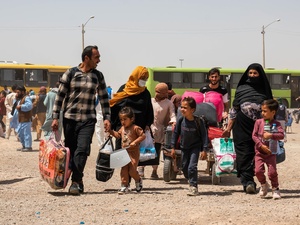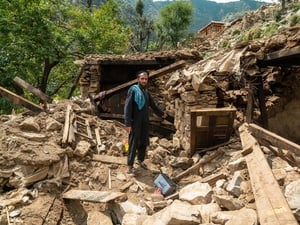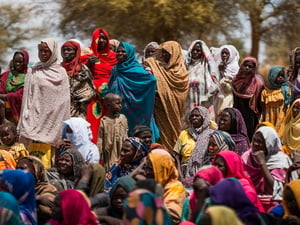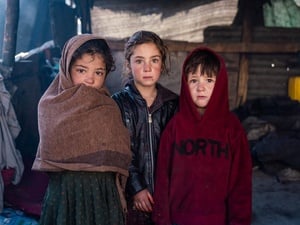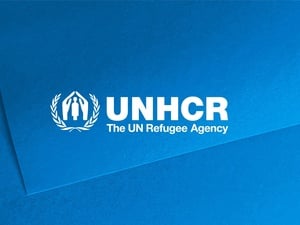Feature: Interviews, inspections and instinct - verifying Afghan returnees
Feature: Interviews, inspections and instinct - verifying Afghan returnees
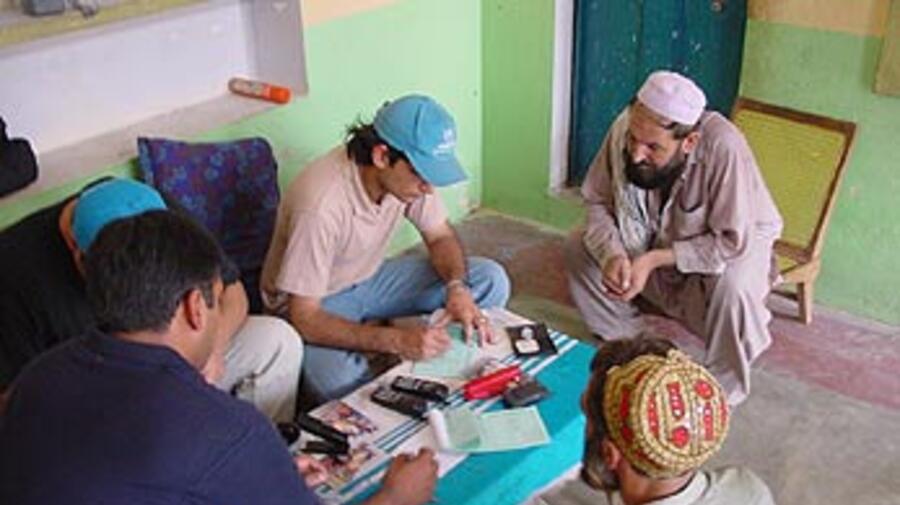
UNHCR teams interview Afghan families in Attock, Pakistan, to determine if they are genuine returnees before handing out slips for travel assistance.
ATTOCK, Pakistan (UNHCR) - Sayed Yahya's refugee family is clearly ready for the return trip to Afghanistan.
Bedding is neatly stacked against the wall of their concrete house. The carpet loom that will continue to provide their livelihood has been dismantled and piled on the packed earth beside the gate to the street. The sense of anticipation among the children staring at the strangers verifying the family's right to travel assistance is palpable.
Visiting the home of Yahya is one of the easier jobs for UNHCR teams in the Pakistani city of Attock, near the Indus River. They must ensure that the thousands of people seeking aid from the agency to get back to Afghanistan are refugees intent on resuming life in their homeland.
UNHCR and the Society for Human Rights and Prisoners Aid (SHARP), the Pakistani non-governmental organisation that helps in the voluntary repatriation programme, operate two sites in Attock where Afghan refugees can seek help to get home. The UN refugee agency pays travel assistance to those who qualify when families reach encashment centres at their destination in Afghanistan.
After the head of a family requests to return under UNHCR's repatriation programme, staff from the agency accompany him back to his home. The team, which includes both men and women so all members of the family can be questioned, must be convinced that the family is really returning and is not composed of "recyclers" - people who have already received aid but are now back in Pakistan hoping for a second payment.
The team has no doubt Yahya is sincere. This Uzbek family is clearly moving all their possessions back to northern Afghanistan, which they left 10 years ago as the country began its slide into internecine warfare.
He even produces a contract for future work in Afghanistan secured with the company his family has been making carpets for in Attock - 10 square metres of meticulously hand-knotted carpet for which they will receive the equivalent of $467.
Not all the team's work is so easy. The same team has just come from a compound in the village of Shakar Dara on the outskirts of Attock, the "home" of a Pashtun man who has asked for help to move his family to the Afghan capital, Kabul. The only belongings the family can show are a few wrapped bundles on a shelf. Even the relationships between the people in the compound seem murky.
Separate conversations with the man who requested the assistance, a mother and a man who says he is the landlord produce only contradictions. The family has been living there anywhere from two to 15 years, depending on who speaks.
"They are bogus," says UNHCR repatriation officer Asif Malik. "We are going to reject them. None of the stories matches."
From the start of the repatriation programme in March, the refugee agency has recognised that measures have to be taken to prevent "recycling", which would divert scarce funds needed to help legitimate returnees.
But, with no birth certificates or other records to examine, sorting the bogus from the real involves indirect checks like talking to neighbours, comparing the histories related by family members and seeing if their luggage contains kitchen equipment. The experienced SHARP teams can often sense something amiss the moment they walk into a fake "home" used in hope of getting UNHCR aid.
So far, about a fifth of those seeking assistance has been turned down, nearly 60,000 families in all. The proportion rejected has risen as procedures are tightened, staff become more skilled and "recyclers" become known at UNHCR centres.
Of greater concern than the "recyclers" is the fear that legitimate returnees may find that they cannot make a success of life back in Afghanistan.
Dr Habib-Ullah used to manage a bustling carpet factory in Attock that indirectly employed thousands of Afghan refugees. The workforce went back to Afghanistan in May and today the factory is empty. But he says some families are drifting back into Pakistan because of concerns in northern Afghanistan about security and a lack of job opportunities. They are not "recyclers", but people who had intended to stay in Afghanistan. If outside assistance does not improve conditions there, says Habib-Ullah, he might have enough workers back in Attock to reopen the factory soon.
Meanwhile, as Yahya readies his relatives to return to Faryab province, his unease about leaving the country he has grown up in is clear. Now 22 years old, he has not been back to Afghanistan in a decade. He sold food on the streets of Karachi until the family moved to Attock two years ago and, with the help of his brothers and sisters, turned to making carpets.
He plans to continue in the carpet business initially back home, but hopes to make it to Kabul eventually and start a small business. His future will be determined by the economic opportunities he finds back in Afghanistan.
"I don't feel like going, I have spent my life here. All the Pakistanis are my friends, our neighbours are asking us to stay," he says. "But my parents went back four months ago and wrote that it is okay to come. I have to go back. It's my country."
By Jack Redden
UNHCR Islamabad


